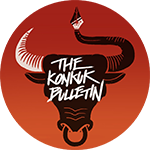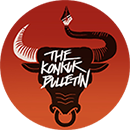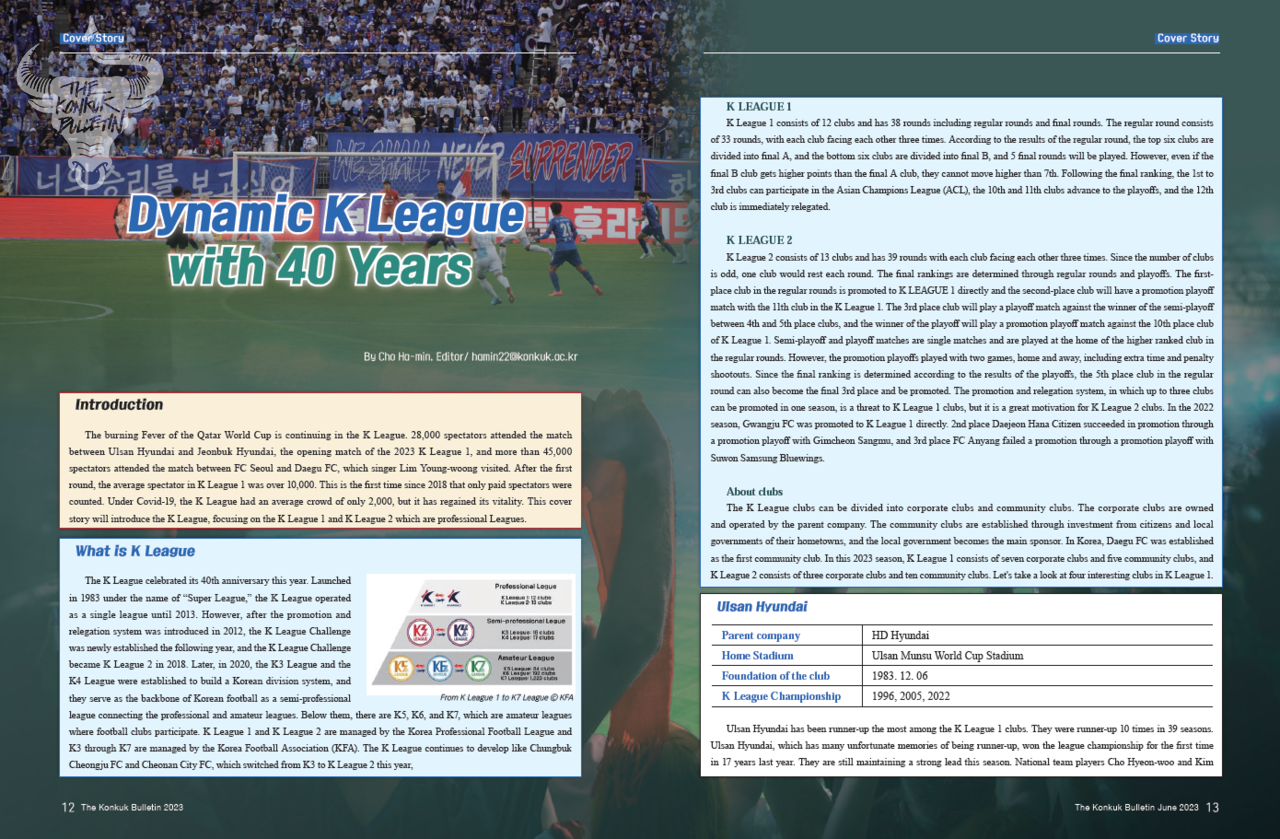
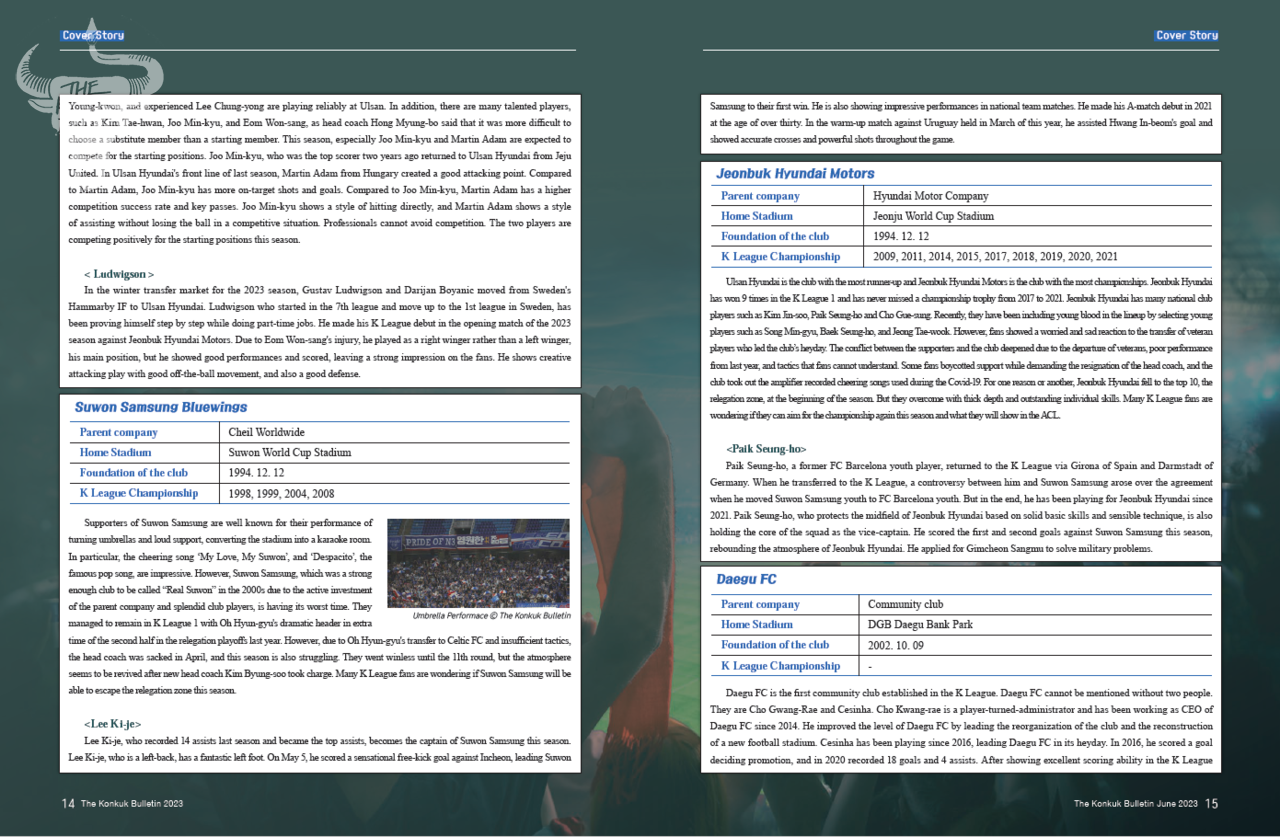
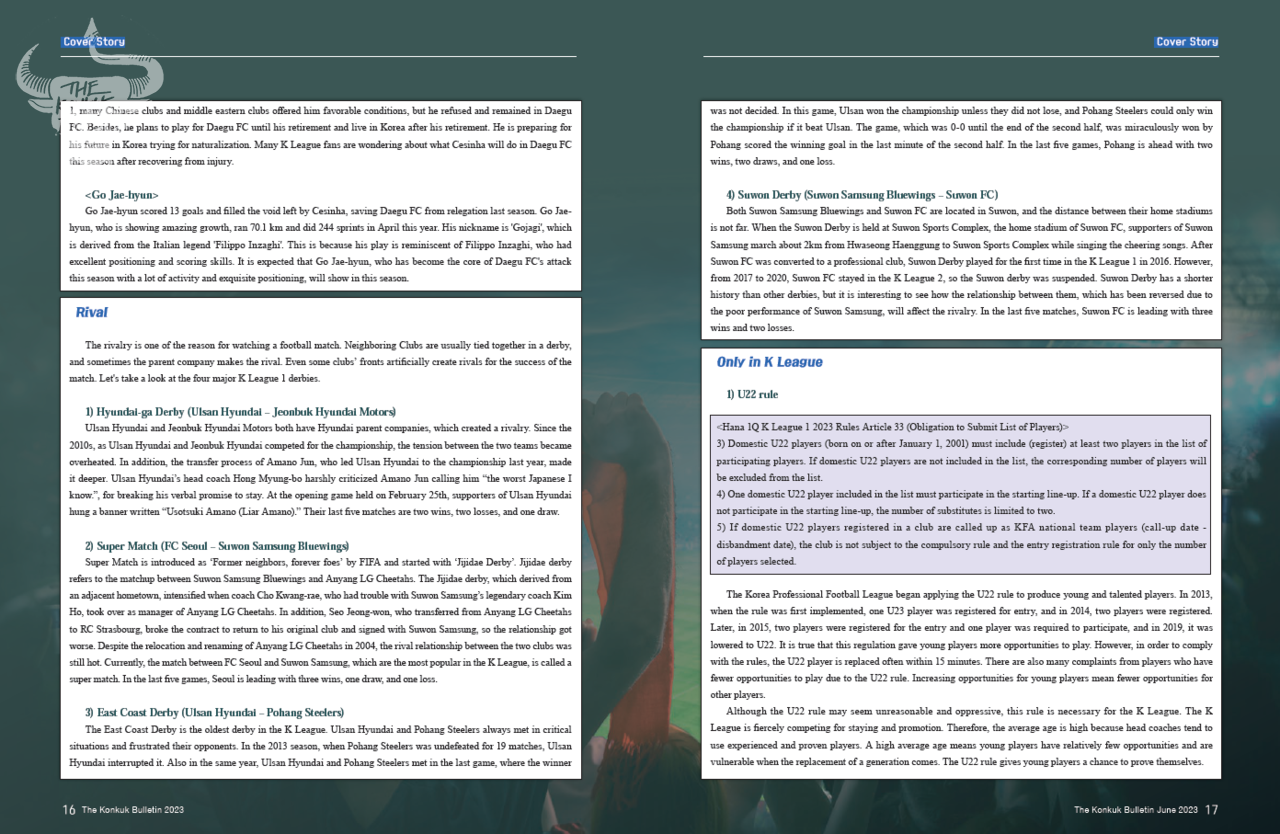
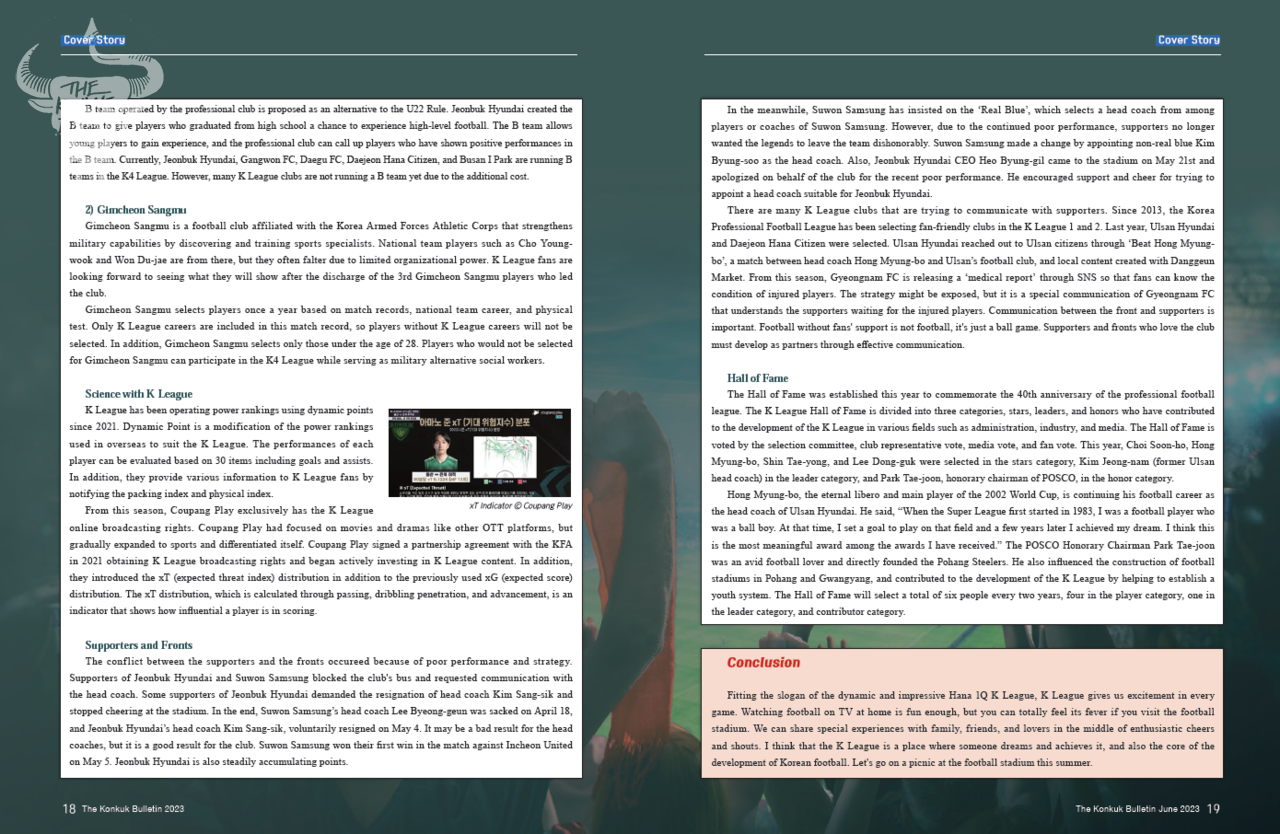
Introduction
The burning Fever of the Qatar World Cup is continuing in the K League. 28,000 spectators attended the match between Ulsan Hyundai and Jeonbuk Hyundai, the opening match of the 2023 K League 1, and more than 45,000 spectators attended the match between FC Seoul and Daegu FC, which singer Lim Young-woong visited. After the first round, the average spectator in K League 1 was over 10,000. This is the first time since 2018 that only paid spectators were counted. Under Covid-19, the K League had an average crowd of only 2,000, but it has regained its vitality. This cover story will introduce the K League, focusing on the K League 1 and K League 2 which are professional Leagues.
What is K League
The K League celebrated its 40th anniversary this year. Launched in 1983 under the name of “Super League,” the K League operated as a single league until 2013. However, after the promotion and relegation system was introduced in 2012, the K League Challenge was newly established the following year, and the K League Challenge became K League 2 in 2018. Later, in 2020, the K3 League and the K4 League were established to build a Korean division system, and they serve as the backbone of Korean football as a semi-professional league connecting the professional and amateur leagues. Below them, there are K5, K6, and K7, which are amateur leagues where football clubs participate. K League 1 and K League 2 are managed by the Korea Professional Football League and K3 through K7 are managed by the Korea Football Association (KFA). The K League continues to develop like Chungbuk Cheongju FC and Cheonan City FC, which switched from K3 to K League 2 this year,
K LEAGUE 1
K League 1 consists of 12 clubs and has 38 rounds including regular rounds and final rounds. The regular round consists of 33 rounds, with each club facing each other three times. According to the results of the regular round, the top six clubs are divided into final A, and the bottom six clubs are divided into final B, and 5 final rounds will be played. However, even if the final B club gets higher points than the final A club, they cannot move higher than 7th. Following the final ranking, the 1st to 3rd clubs can participate in the Asian Champions League (ACL), the 10th and 11th clubs advance to the playoffs, and the 12th club is immediately relegated.
K LEAGUE 2
K League 2 consists of 13 clubs and has 39 rounds with each club facing each other three times. Since the number of clubs is odd, one club would rest each round. The final rankings are determined through regular rounds and playoffs. The first-place club in the regular rounds is promoted to K LEAGUE 1 directly and the second-place club will have a promotion playoff match with the 11th club in the K League 1. The 3rd place club will play a playoff match against the winner of the semi-playoff between 4th and 5th place clubs, and the winner of the playoff will play a promotion playoff match against the 10th place club of K League 1. Semi-playoff and playoff matches are single matches and are played at the home of the higher ranked club in the regular rounds. However, the promotion playoffs played with two games, home and away, including extra time and penalty shootouts. Since the final ranking is determined according to the results of the playoffs, the 5th place club in the regular round can also become the final 3rd place and be promoted. The promotion and relegation system, in which up to three clubs can be promoted in one season, is a threat to K League 1 clubs, but it is a great motivation for K League 2 clubs. In the 2022 season, Gwangju FC was promoted to K League 1 directly. 2nd place Daejeon Hana Citizen succeeded in promotion through a promotion playoff with Gimcheon Sangmu, and 3rd place FC Anyang failed a promotion through a promotion playoff with Suwon Samsung Bluewings.
About clubs
The K League clubs can be divided into corporate clubs and community clubs. The corporate clubs are owned and operated by the parent company. The community clubs are established through investment from citizens and local governments of their hometowns, and the local government becomes the main sponsor. In Korea, Daegu FC was established as the first community club. In this 2023 season, K League 1 consists of seven corporate clubs and five community clubs, and K League 2 consists of three corporate clubs and ten community clubs. Let's take a look at four interesting clubs in K League 1.
Ulsan Hyundai
|
Parent company |
HD Hyundai |
|
Home Stadium |
Ulsan Munsu World Cup Stadium |
|
Foundation of the club |
1983. 12. 06 |
|
K League Championship |
1996, 2005, 2022 |
Ulsan Hyundai has been runner-up the most among the K League 1 clubs. They were runner-up 10 times in 39 seasons. Ulsan Hyundai, which has many unfortunate memories of being runner-up, won the league championship for the first time in 17 years last year. They are still maintaining a strong lead this season. National team players Cho Hyeon-woo and Kim Young-kwon, and experienced Lee Chung-yong are playing reliably at Ulsan. In addition, there are many talented players, such as Kim Tae-hwan, Joo Min-kyu, and Eom Won-sang, as head coach Hong Myung-bo said that it was more difficult to choose a substitute member than a starting member. This season, especially Joo Min-kyu and Martin Adam are expected to compete for the starting positions. Joo Min-kyu, who was the top scorer two years ago returned to Ulsan Hyundai from Jeju United. In Ulsan Hyundai's front line of last season, Martin Adam from Hungary created a good attacking point. Compared to Martin Adam, Joo Min-kyu has more on-target shots and goals. Compared to Joo Min-kyu, Martin Adam has a higher competition success rate and key passes. Joo Min-kyu shows a style of hitting directly, and Martin Adam shows a style of assisting without losing the ball in a competitive situation. Professionals cannot avoid competition. The two players are competing positively for the starting positions this season.
< Ludwigson >
In the winter transfer market for the 2023 season, Gustav Ludwigson and Darijan Boyanic moved from Sweden's Hammarby IF to Ulsan Hyundai. Ludwigson who started in the 7th league and move up to the 1st league in Sweden, has been proving himself step by step while doing part-time jobs. He made his K League debut in the opening match of the 2023 season against Jeonbuk Hyundai Motors. Due to Eom Won-sang's injury, he played as a right winger rather than a left winger, his main position, but he showed good performances and scored, leaving a strong impression on the fans. He shows creative attacking play with good off-the-ball movement, and also a good defense.
Suwon Samsung Bluewings
|
Parent company |
Cheil Worldwide |
|
Home Stadium |
Suwon World Cup Stadium |
|
Foundation of the club |
1994. 12. 12 |
|
K League Championship |
1998, 1999, 2004, 2008 |
Supporters of Suwon Samsung are well known for their performance of turning umbrellas and loud support, converting the stadium into a karaoke room. In particular, the cheering song ‘My Love, My Suwon’, and ‘Despacito’, the famous pop song, are impressive. However, Suwon Samsung, which was a strong enough club to be called “Real Suwon” in the 2000s due to the active investment of the parent company and splendid club players, is having its worst time. They managed to remain in K League 1 with Oh Hyun-gyu's dramatic header in extra time of the second half in the relegation playoffs last year. However, due to Oh Hyun-gyu's transfer to Celtic FC and insufficient tactics, the head coach was sacked in April, and this season is also struggling. They went winless until the 11th round, but the atmosphere seems to be revived after new head coach Kim Byung-soo took charge. Many K League fans are wondering if Suwon Samsung will be able to escape the relegation zone this season.
<Lee Ki-je>
Lee Ki-je, who recorded 14 assists last season and became the top assists, becomes the captain of Suwon Samsung this season. Lee Ki-je, who is a left-back, has a fantastic left foot. On May 5, he scored a sensational free-kick goal against Incheon, leading Suwon Samsung to their first win. He is also showing impressive performances in national team matches. He made his A-match debut in 2021 at the age of over thirty. In the warm-up match against Uruguay held in March of this year, he assisted Hwang In-beom's goal and showed accurate crosses and powerful shots throughout the game.
Jeonbuk Hyundai Motors
|
Parent company |
Hyundai Motor Company |
|
Home Stadium |
Jeonju World Cup Stadium |
|
Foundation of the club |
1994. 12. 12 |
|
K League Championship |
2009, 2011, 2014, 2015, 2017, 2018, 2019, 2020, 2021 |
Ulsan Hyundai is the club with the most runner-up and Jeonbuk Hyundai Motors is the club with the most championships. Jeonbuk Hyundai has won 9 times in the K League 1 and has never missed a championship trophy from 2017 to 2021. Jeonbuk Hyundai has many national club players such as Kim Jin-soo, Paik Seung-ho and Cho Gue-sung. Recently, they have been including young blood in the lineup by selecting young players such as Song Min-gyu, Baek Seung-ho, and Jeong Tae-wook. However, fans showed a worried and sad reaction to the transfer of veteran players who led the club’s heyday. The conflict between the supporters and the club deepened due to the departure of veterans, poor performance from last year, and tactics that fans cannot understand. Some fans boycotted support while demanding the resignation of the head coach, and the club took out the amplifier recorded cheering songs used during the Covid-19. For one reason or another, Jeonbuk Hyundai fell to the top 10, the relegation zone, at the beginning of the season. But they overcome with thick depth and outstanding individual skills. Many K League fans are wondering if they can aim for the championship again this season and what they will show in the ACL.
<Paik Seung-ho>
Paik Seung-ho, a former FC Barcelona youth player, returned to the K League via Girona of Spain and Darmstadt of Germany. When he transferred to the K League, a controversy between him and Suwon Samsung arose over the agreement when he moved Suwon Samsung youth to FC Barcelona youth. But in the end, he has been playing for Jeonbuk Hyundai since 2021. Paik Seung-ho, who protects the midfield of Jeonbuk Hyundai based on solid basic skills and sensible technique, is also holding the core of the squad as the vice-captain. He scored the first and second goals against Suwon Samsung this season, rebounding the atmosphere of Jeonbuk Hyundai. He applied for Gimcheon Sangmu to solve military problems.
Daegu FC
|
Parent company |
Community club |
|
Home Stadium |
DGB Daegu Bank Park |
|
Foundation of the club |
2002. 10. 09 |
|
K League Championship |
- |
Daegu FC is the first community club established in the K League. Daegu FC cannot be mentioned without two people. They are Cho Gwang-Rae and Cesinha. Cho Kwang-rae is a player-turned-administrator and has been working as CEO of Daegu FC since 2014. He improved the level of Daegu FC by leading the reorganization of the club and the reconstruction of a new football stadium. Cesinha has been playing since 2016, leading Daegu FC in its heyday. In 2016, he scored a goal deciding promotion, and in 2020 recorded 18 goals and 4 assists. After showing excellent scoring ability in the K League 1, many Chinese clubs and middle eastern clubs offered him favorable conditions, but he refused and remained in Daegu FC. Besides, he plans to play for Daegu FC until his retirement and live in Korea after his retirement. He is preparing for his future in Korea trying for naturalization. Many K League fans are wondering about what Cesinha will do in Daegu FC this season after recovering from injury.
<Go Jae-hyun>
Go Jae-hyun scored 13 goals and filled the void left by Cesinha, saving Daegu FC from relegation last season. Go Jae-hyun, who is showing amazing growth, ran 70.1 km and did 244 sprints in April this year. His nickname is 'Gojagi', which is derived from the Italian legend 'Filippo Inzaghi'. This is because his play is reminiscent of Filippo Inzaghi, who had excellent positioning and scoring skills. It is expected that Go Jae-hyun, who has become the core of Daegu FC's attack this season with a lot of activity and exquisite positioning, will show in this season.
Rival
The rivalry is one of the reason for watching a football match. Neighboring Clubs are usually tied together in a derby, and sometimes the parent company makes the rival. Even some clubs’ fronts artificially create rivals for the success of the match. Let's take a look at the four major K League 1 derbies.
1) Hyundai-ga Derby (Ulsan Hyundai – Jeonbuk Hyundai Motors)
Ulsan Hyundai and Jeonbuk Hyundai Motors both have Hyundai parent companies, which created a rivalry. Since the 2010s, as Ulsan Hyundai and Jeonbuk Hyundai competed for the championship, the tension between the two teams became overheated. In addition, the transfer process of Amano Jun, who led Ulsan Hyundai to the championship last year, made it deeper. Ulsan Hyundai’s head coach Hong Myung-bo harshly criticized Amano Jun calling him “the worst Japanese I know.”, for breaking his verbal promise to stay. At the opening game held on February 25th, supporters of Ulsan Hyundai hung a banner written “Usotsuki Amano (Liar Amano).” Their last five matches are two wins, two losses, and one draw.
2) Super Match (FC Seoul – Suwon Samsung Bluewings)
Super Match is introduced as ‘Former neighbors, forever foes’ by FIFA and started with ‘Jijidae Derby’. Jijidae derby refers to the matchup between Suwon Samsung Bluewings and Anyang LG Cheetahs. The Jijidae derby, which derived from an adjacent hometown, intensified when coach Cho Kwang-rae, who had trouble with Suwon Samsung’s legendary coach Kim Ho, took over as manager of Anyang LG Cheetahs. In addition, Seo Jeong-won, who transferred from Anyang LG Cheetahs to RC Strasbourg, broke the contract to return to his original club and signed with Suwon Samsung, so the relationship got worse. Despite the relocation and renaming of Anyang LG Cheetahs in 2004, the rival relationship between the two clubs was still hot. Currently, the match between FC Seoul and Suwon Samsung, which are the most popular in the K League, is called a super match. In the last five games, Seoul is leading with three wins, one draw, and one loss.
3) East Coast Derby (Ulsan Hyundai – Pohang Steelers)
The East Coast Derby is the oldest derby in the K League. Ulsan Hyundai and Pohang Steelers always met in critical situations and frustrated their opponents. In the 2013 season, when Pohang Steelers was undefeated for 19 matches, Ulsan Hyundai interrupted it. Also in the same year, Ulsan Hyundai and Pohang Steelers met in the last game, where the winner was not decided. In this game, Ulsan won the championship unless they did not lose, and Pohang Steelers could only win the championship if it beat Ulsan. The game, which was 0-0 until the end of the second half, was miraculously won by Pohang scored the winning goal in the last minute of the second half. In the last five games, Pohang is ahead with two wins, two draws, and one loss.
4) Suwon Derby (Suwon Samsung Bluewings – Suwon FC)
Both Suwon Samsung Bluewings and Suwon FC are located in Suwon, and the distance between their home stadiums is not far. When the Suwon Derby is held at Suwon Sports Complex, the home stadium of Suwon FC, supporters of Suwon Samsung march about 2km from Hwaseong Haenggung to Suwon Sports Complex while singing the cheering songs. After Suwon FC was converted to a professional club, Suwon Derby played for the first time in the K League 1 in 2016. However, from 2017 to 2020, Suwon FC stayed in the K League 2, so the Suwon derby was suspended. Suwon Derby has a shorter history than other derbies, but it is interesting to see how the relationship between them, which has been reversed due to the poor performance of Suwon Samsung, will affect the rivalry. In the last five matches, Suwon FC is leading with three wins and two losses.
Only in K League
1) U22 rule
|
<Hana 1Q K League 1 2023 Rules Article 33 (Obligation to Submit List of Players)> 3) Domestic U22 players (born on or after January 1, 2001) must include (register) at least two players in the list of participating players. If domestic U22 players are not included in the list, the corresponding number of players will be excluded from the list. 4) One domestic U22 player included in the list must participate in the starting line-up. If a domestic U22 player does not participate in the starting line-up, the number of substitutes is limited to two. 5) If domestic U22 players registered in a club are called up as KFA national team players (call-up date - disbandment date), the club is not subject to the compulsory rule and the entry registration rule for only the number of players selected. |
The Korea Professional Football League began applying the U22 rule to produce young and talented players. In 2013, when the rule was first implemented, one U23 player was registered for entry, and in 2014, two players were registered. Later, in 2015, two players were registered for the entry and one player was required to participate, and in 2019, it was lowered to U22. It is true that this regulation gave young players more opportunities to play. However, in order to comply with the rules, the U22 player is replaced often within 15 minutes. There are also many complaints from players who have fewer opportunities to play due to the U22 rule. Increasing opportunities for young players mean fewer opportunities for other players.
Although the U22 rule may seem unreasonable and oppressive, this rule is necessary for the K League. The K League is fiercely competing for staying and promotion. Therefore, the average age is high because head coaches tend to use experienced and proven players. A high average age means young players have relatively few opportunities and are vulnerable when the replacement of a generation comes. The U22 rule gives young players a chance to prove themselves.
B team operated by the professional club is proposed as an alternative to the U22 Rule. Jeonbuk Hyundai created the B team to give players who graduated from high school a chance to experience high-level football. The B team allows young players to gain experience, and the professional club can call up players who have shown positive performances in the B team. Currently, Jeonbuk Hyundai, Gangwon FC, Daegu FC, Daejeon Hana Citizen, and Busan I Park are running B teams in the K4 League. However, many K League clubs are not running a B team yet due to the additional cost.
2) Gimcheon Sangmu
Gimcheon Sangmu is a football club affiliated with the Korea Armed Forces Athletic Corps that strengthens military capabilities by discovering and training sports specialists. National team players such as Cho Young-wook and Won Du-jae are from there, but they often falter due to limited organizational power. K League fans are looking forward to seeing what they will show after the discharge of the 3rd Gimcheon Sangmu players who led the club.
Gimcheon Sangmu selects players once a year based on match records, national team career, and physical test. Only K League careers are included in this match record, so players without K League careers will not be selected. In addition, Gimcheon Sangmu selects only those under the age of 28. Players who would not be selected for Gimcheon Sangmu can participate in the K4 League while serving as military alternative social workers.
Science with K League
K League has been operating power rankings using dynamic points since 2021. Dynamic Point is a modification of the power rankings used in overseas to suit the K League. The performances of each player can be evaluated based on 30 items including goals and assists. In addition, they provide various information to K League fans by notifying the packing index and physical index.
From this season, Coupang Play exclusively has the K League online broadcasting rights. Coupang Play had focused on movies and dramas like other OTT platforms, but gradually expanded to sports and differentiated itself. Coupang Play signed a partnership agreement with the KFA in 2021 obtaining K League broadcasting rights and began actively investing in K League content. In addition, they introduced the xT (expected threat index) distribution in addition to the previously used xG (expected score) distribution. The xT distribution, which is calculated through passing, dribbling penetration, and advancement, is an indicator that shows how influential a player is in scoring.
Supporters and Fronts
The conflict between the supporters and the fronts occureed because of poor performance and strategy. Supporters of Jeonbuk Hyundai and Suwon Samsung blocked the club's bus and requested communication with the head coach. Some supporters of Jeonbuk Hyundai demanded the resignation of head coach Kim Sang-sik and stopped cheering at the stadium. In the end, Suwon Samsung’s head coach Lee Byeong-geun was sacked on April 18, and Jeonbuk Hyundai’s head coach Kim Sang-sik, voluntarily resigned on May 4. It may be a bad result for the head coaches, but it is a good result for the club. Suwon Samsung won their first win in the match against Incheon United on May 5. Jeonbuk Hyundai is also steadily accumulating points.
In the meanwhile, Suwon Samsung has insisted on the ‘Real Blue’, which selects a head coach from among players or coaches of Suwon Samsung. However, due to the continued poor performance, supporters no longer wanted the legends to leave the team dishonorably. Suwon Samsung made a change by appointing non-real blue Kim Byung-soo as the head coach. Also, Jeonbuk Hyundai CEO Heo Byung-gil came to the stadium on May 21st and apologized on behalf of the club for the recent poor performance. He encouraged support and cheer for trying to appoint a head coach suitable for Jeonbuk Hyundai.
There are many K League clubs that are trying to communicate with supporters. Since 2013, the Korea Professional Football League has been selecting fan-friendly clubs in the K League 1 and 2. Last year, Ulsan Hyundai and Daejeon Hana Citizen were selected. Ulsan Hyundai reached out to Ulsan citizens through ‘Beat Hong Myung-bo’, a match between head coach Hong Myung-bo and Ulsan’s football club, and local content created with Danggeun Market. From this season, Gyeongnam FC is releasing a ‘medical report’ through SNS so that fans can know the condition of injured players. The strategy might be exposed, but it is a special communication of Gyeongnam FC that understands the supporters waiting for the injured players. Communication between the front and supporters is important. Football without fans' support is not football, it's just a ball game. Supporters and fronts who love the club must develop as partners through effective communication.
Hall of Fame
The Hall of Fame was established this year to commemorate the 40th anniversary of the professional football league. The K League Hall of Fame is divided into three categories, stars, leaders, and honors who have contributed to the development of the K League in various fields such as administration, industry, and media. The Hall of Fame is voted by the selection committee, club representative vote, media vote, and fan vote. This year, Choi Soon-ho, Hong Myung-bo, Shin Tae-yong, and Lee Dong-guk were selected in the stars category, Kim Jeong-nam (former Ulsan head coach) in the leader category, and Park Tae-joon, honorary chairman of POSCO, in the honor category.
Hong Myung-bo, the eternal libero and main player of the 2002 World Cup, is continuing his football career as the head coach of Ulsan Hyundai. He said, “When the Super League first started in 1983, I was a football player who was a ball boy. At that time, I set a goal to play on that field and a few years later I achieved my dream. I think this is the most meaningful award among the awards I have received.” The POSCO Honorary Chairman Park Tae-joon was an avid football lover and directly founded the Pohang Steelers. He also influenced the construction of football stadiums in Pohang and Gwangyang, and contributed to the development of the K League by helping to establish a youth system. The Hall of Fame will select a total of six people every two years, four in the player category, one in the leader category, and contributor category.
Conclusion
Fitting the slogan of the dynamic and impressive Hana 1Q K League, K League gives us excitement in every game. Watching football on TV at home is fun enough, but you can totally feel its fever if you visit the football stadium. We can share special experiences with family, friends, and lovers in the middle of enthusiastic cheers and shouts. I think that the K League is a place where someone dreams and achieves it, and also the core of the development of Korean football. Let's go on a picnic at the football stadium this summer.
* All match records were written as of May 21st.
